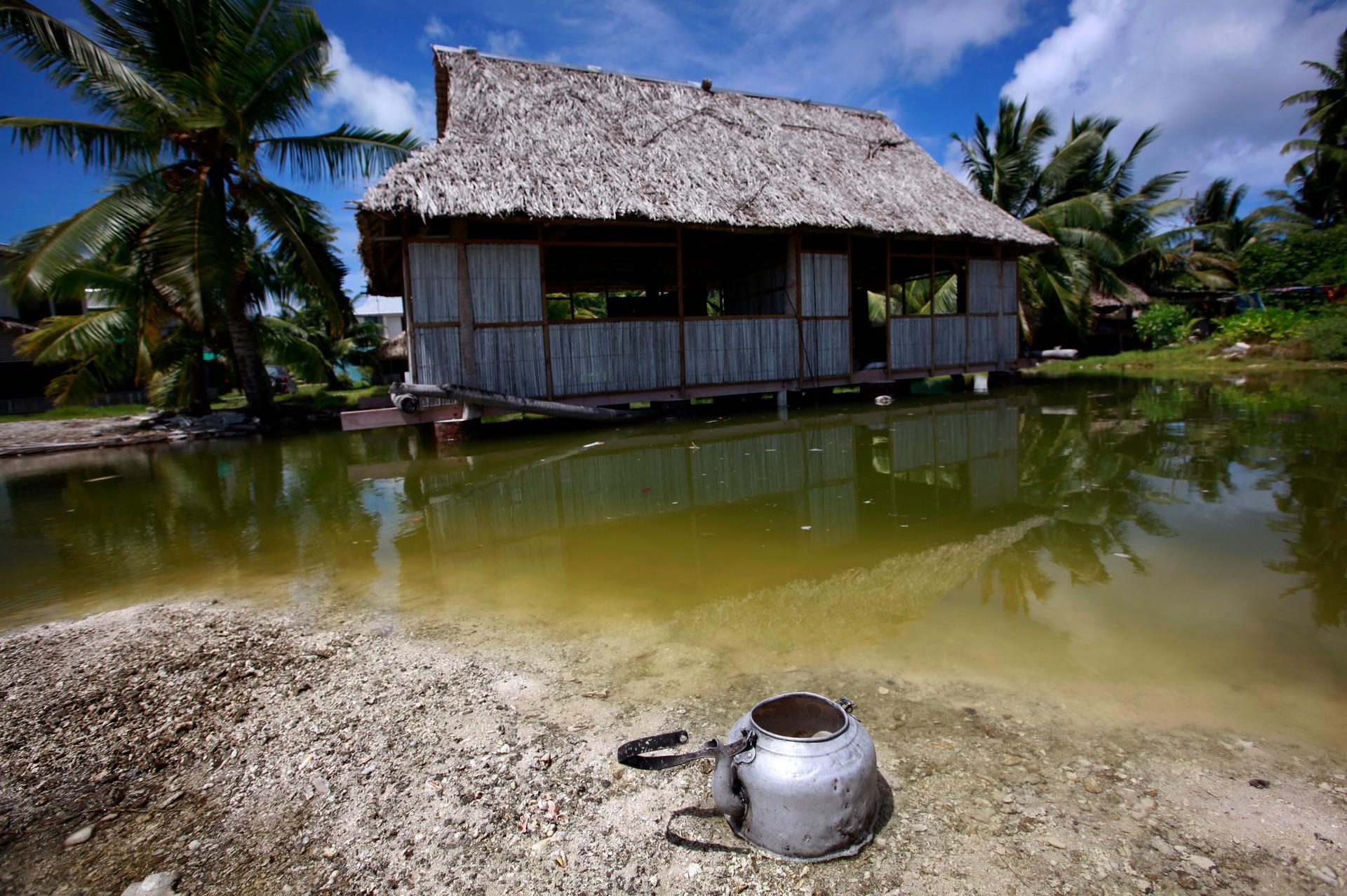In Pacific island nations, there’s nowhere left to run from climate change
An abandoned house next to a small lagoon on South Tarawa in the central Pacific island nation of Kiribati in 2013. Nations like Kiribati and the Marshall Islands may disappear due to climate change.
From around the country and across the globe, an estimated 400,000 marchers came to New York City for the People's Climate March on Sunday.
The march coincided with the start of the United Nations Climate Summit. The meeting, which began Tuesday in New York, brings 120 world leaders together in an effort to improve upon the last summit, which was held five years ago in Copenhagen and called "disappointing in substance and hectic in progress."
In attendance is the leadership of the Marshall Islands in the Pacific. The country is made up of low-lying, ring-shaped islands, the highest of which is only two meters above sea level. To say that the Marshall Islands are vulnerable to the effects of global climate change is an understatement.
“Anything that the sea does is felt immediately by our people,” says Tony De Brum, the foreign minister of the Marshall Islands. “As the tide comes in a lot higher than it used to, it begins to affect life as we know it — not only as to where you can live or have a family, but also where you can grow your food, where you draw your water and where you bury your dead.”
De Brum says the side effects of climate change are already being felt in not just the Marshall Islands, but the Federated States of Micronesia, Tuvalu and other Pacific nations as well.
“If we do not keep the temperature under two degrees centigrade, as the United Nations FCCC [Framework Convention on Climate Change] is trying to do, then in 50 years there will be nobody living there,” he says. “Already, communities are having to move from their traditional sites because of erosion and the impending movement of the water.”
Many citizens of the Marshall Islands feel their sense of identity is attached to specific localities. And now they are finding that the places they have called home are no longer inhabitable.
“The displacement that is occurring now is because of droughts and floods,” he says. “Thousands have been moved from their homes to places that they do not traditionally belong in order for them to get away from the immediate effects of climate change.”
And while many are moving to different islands, many other citizens are abandoning the country altogether. As the waters continue to rise, there is nowhere left to run.
“Many of our people live in America, but more are moving there because of the threat of climate change — and more will move if it continues to threaten us,” De Brum says. “We will try to do what we can to keep our population in place because moving people threatens our traditions, language, culture — everything that we stand for.”
Marshall Island officials are feeling the effects of climate change along with their constitutents: The home of President Christopher Loeak has been touched by rising waters.
“He himself had to build a wall around his house to prevent the salt water from inundating,” De Brum says. “Our airport retaining wall that keeps the saltwater out of the landing strip has been breached. You will see buildings being flooded and roads being cut.”
And not even the dead are safe from the effects of climate change. “Our graveyards are also being undermined — coffins and bodies are being dug out from the seashore,” De Brum says.
As the crisis gets worse, De Brum is hoping an urgent call to action will resonate in the UN's halls.
“We still hold our hopes high that the world will realize that allowing the Islands to go under is not a solution,” he says. “I don’t think that’s an option. We will continue to fight to make sure that the world understands that it’s still possible to do something about the effects of climate change. We hope that this week in New York we can convince those that still have doubts.”
This story originally aired on PRI's The Takeaway, a public radio program that invites you to be part of the American conversation.
Our coverage reaches millions each week, but only a small fraction of listeners contribute to sustain our program. We still need 224 more people to donate $100 or $10/monthly to unlock our $67,000 match. Will you help us get there today?
